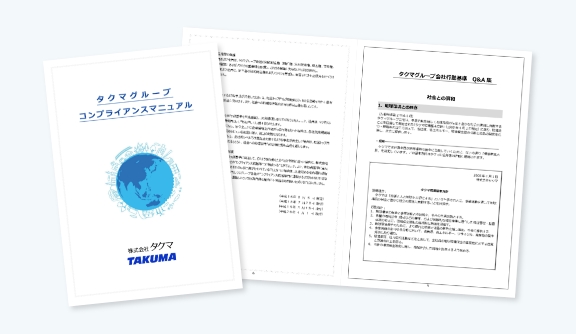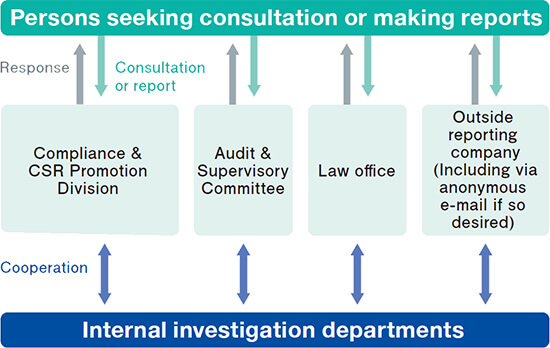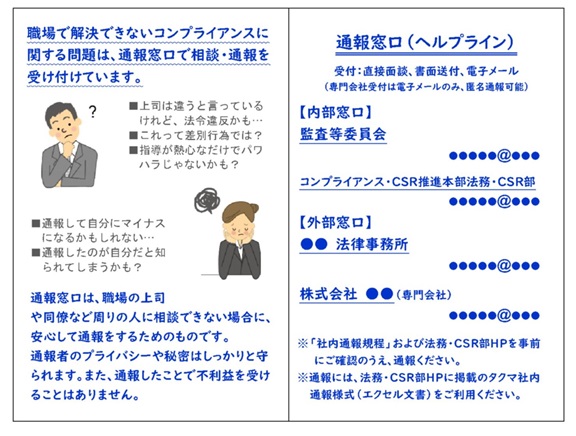
We have identified the strengthening of corporate governance as a key issue (Materiality) related to ESG, and we’re aware of the cessation of businesses and decline in social trust that could result from violations of laws related to competition, bribery and corruption, and the environment as risks. Specifically, we’re working to continue appropriate internal audits, enhance the effectiveness of risk management activities, and offer compliance education on an ongoing basis.
Towards ensuring permanent compliance with the Antimonopoly Act, TAKUMA enacted “Regulations Concerning Management of the Pledge of Antimonopoly Act Compliance,” which provides for the submission of a written oath in regard to observing the Antimonopoly Act.
“Rules on Controlling Contact with Competitors’ Sales Departments, etc.,” defines the procedure for an employee when interacting with the sales department, etc., of a competitor and specifies that an application should be made to and an approval should be obtained from the affiliated division or center manager and the compliance management department in advance and a report is to be made after contact to ensure fair business contact.
The Takuma Group is a signatory to the United Nations Global Compact, and we support its 10 fundamental principles in the four areas of human rights, labor, environment, and anti-corruption. In addition, the Board of Directors has adopted the Takuma Group Ethics Charter and the Takuma Group Code of Conduct, and we strive to spread awareness of their provisions at the Takuma Group. Part of that effort includes detailed training on the Ethical Rules for Employees of Government Agencies and Local Public Bodies.
Officers and employees shall comply with laws including the Political Funds Control Act, Public Offices Election Act, and National Public Service Ethics Act when engaging in transactions with public bodies or making political contributions. They shall avoid not only violations of applicable laws, but also conduct which invites questions concerning its legality.
(1) Officers and employees shall not entertain or give gifts to employees of government agencies or local public bodies (including former employees), or to public servants of other countries (including former public servants).
(2) Officers and employees shall not deviate from standard business practices when being accepting entertainment or gifts.
Basic policy
Directors, executive officers, and employees shall strive to comply with the Takuma Group Ethics Charter and the Takuma Group Code of Conduct, which set forth a standard of conduct.
Overview of status of implementation
The Takuma Group Ethics Charter and the Takuma Group Code of Conduct shall be distributed to directors, executive officers, and employees, and the Company shall work to ensure awareness of their provisions.
The basic contract and basic construction contract we use for new business partners include provisions concerning the exclusion of anti-social forces. In addition, we’ve compiled a set of CSR procurement guidelines with clear provisions to prevent corruption, and they require business partners to cooperate with associated measures. In addition, the form we use to consider whether to establish a business relationship with prospective manufacturers includes a “non-involvement with anti-social forces” checkbox. Moreover, in credit management, we review the status of efforts to address anti-social forces based on credit information published by credit agencies when evaluating business partners.
When forming joint ventures (JV), we enter into agreements with the company forming the JV by the bidding date. Those agreements include provisions related to legal compliance and relationships with anti-social forces.
Since 2006, we have been distributing a Compliance Manual that includes an explanation of the rules and standards of conduct as well as an FAQ to all employees in accordance with The TAKUMA Group Ethics Charter and the TAKUMA Group Code of Conduct. This manual is utilized in the course of daily operations and departmental training.(Distributed only in Japanese.)

We have been conducting a CSR Awareness Survey since FY2008 in order to quantitatively assess the level of compliance and CSR awareness along with the effectiveness of related promotional and educational efforts. The results of this survey are used when summarizing the activities of each fiscal year and in formulating the upcoming year’s action plan, as well as in future compliance and CSR promotion activities. The survey was expanded to include group companies in FY2013.
We use the results of the survey to improve compliance and CSR promotion activities on an ongoing basis, for example by implementing education about the items whose scores fell from the previous survey.
Based on the results of the CSR Awareness Survey, which is administered annually to all officers and employees, we’ve determined that respondents’ conduct accords with the Company Motto, Management Principles, Ethics Charter, and Code of Conduct, and that those standards of conduct are functioning effectively. In addition, the results of the CSR Awareness Survey are reported to the Board of Directors.
TAKUMA has been operating an internal reporting system since FY2006, with the aim of promoting compliance management by preventing illegal or unfair acts, and uncovering as early as possible and undertaking corrective measures.
Reporting contacts are set up at our Audit and Supervisory Committee and Compliance & CSR Promotion Division, and at an outside law office as well as a dedicated external expert company for anonymous e-mail reporting. Our “Internal Reporting Code” and the TAKUMA Group Code of Conduct further declare that no informant shall be subjected to disadvantageous treatment simply because he or she filed a report.

Furthermore, in order for the Internal Reporting System to be correctly understood and utilized, we work to raise awareness, publish information on the corporate intranet, and distribute a compliance manual and “Compliance Card” with contact information for our reporting hotlines to all employees.

In addition, we administer e-learning programs covering prevention of harassment in the workplace and the Internal Reporting System to all newly hired workers (including outside employees). Many past reports concern bullying, abusive behavior, or harassment, which we deal with internally.
Internal rules require that workers whose responsibilities include the Internal Reporting System be drawn from the main career track or higher positions, and those workers undergo outside training when they are assigned to those positions or engaged in the work. In addition, they participate in outside workshops where they learn how to do their jobs and study incidents that have occurred at other companies.